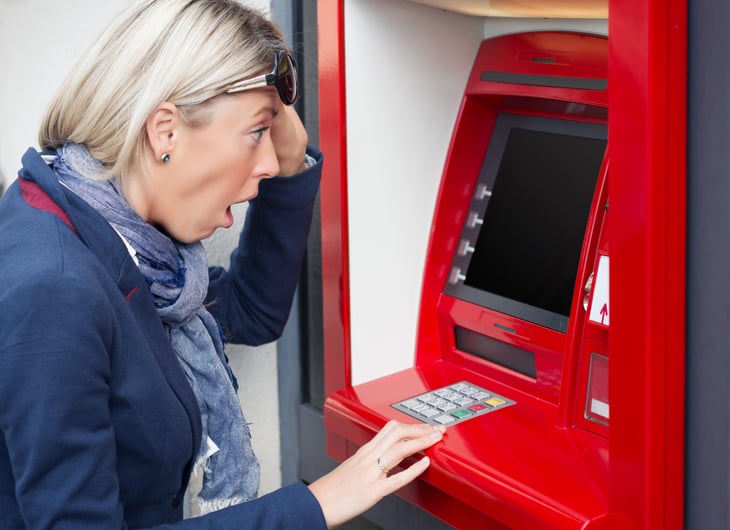
Identity thieves are looking for ways to use your personal information to run up charges in your name, steal medical account information and even grab tax refunds.
Consumers filed more than 2.4 million identity theft reports with the Federal Trade Commission in 2022. Combined with reports shared from federal, state, and local law enforcement agencies and other groups, the number topped 5.1 million.
Keep your guard up by heeding these warning signs identified by the FTC.
1. You notice changes in your credit report

When you check your credit report, keep an eye out for anything unusual. That includes charges (see No. 3 on this list) and accounts that you don’t recognize. This can be evidence that an identity thief has accessed your credit accounts or opened new accounts in your name.
Checking your credit report regularly is a smart habit to adopt, and it’s easy to do online.
You are entitled by federal law to one free report every 12 months from each of the three major credit-reporting companies — Equifax, Experian and TransUnion.
2. A merchant declines your check

If you balance your checkbook and pay bills on time each month, you may be shocked if a merchant refuses a personal check out of the blue. It could be a sign that a thief has been using your bank account or opened an associated account in your name.
To learn more, check out “How to Tell If Fraudsters Have Opened Bank Accounts in Your Name.”
3. You discover unexplained charges

This warning sign may be the easiest one to spot: Check your bank and credit card account statements for unusual charges.
If you see withdrawals that you don’t recognize and can’t explain, for example, a thief may have cracked your account and made charges in your name.
If you are a victim of identity theft, file a report with the Federal Trade Commission at IdentityTheft.gov.
Also, you may want to contact the three major credit bureaus to request a credit freeze. Also known as a security freeze, this prevents new accounts from being opened in your name, as we detail in “3 Ways to Protect Your Credit — and Their Pros and Cons.”
You now can place and lift a credit freeze for free, thanks to a 2018 federal law.
4. Mail doesn’t arrive

If you are receiving fewer items from the U.S. Postal Service than you typically do, a thief may be intercepting your mail. If your bills or other correspondence fail to appear as expected, be suspicious. A thief may be at work.
5. Debt collectors call

Likewise, if you’ve always been diligent in paying your bills, take notice if you get a call from a debt collector.
Such collectors could be calling about debts that were not incurred by you. The unpaid bill now in collection may belong to an identity thief. Unfortunately, your name is on the bill.
To learn how to respond if this happens to you, check out “What to Do When Debt Collectors Call — Even If You Don’t Owe Money.”
6. Your health insurer rejects a claim

Another sign of trouble is when your health insurer rejects your legitimate medical claim because the insurer’s records indicate that you’ve reached the limit of your benefits.
This can happen if thieves target your medical account, taking advantage of all the benefits so you can’t make a legitimate claim.
Data breaches in medical offices and phishing emails are two ways that medical identity theft happens, says John Breyault, a spokesperson for the National Consumers League.
Identity thieves use phishing email scams to trick consumers into sharing personal information such as Social Security numbers, and other account numbers and passwords. Be careful about whom you provide information to online. Do not click on unfamiliar or potentially suspicious links.
7. You receive an unexplained medical bill

You may be puzzled if you receive a bill from a doctor or other medical provider for services you didn’t use.
If this happens, be suspicious. A thief may have gotten your health insurance information and used it to receive medical care, leaving you with the bill. This is a form of medical identity theft.
Take action quickly. Report the breach to your medical provider and health insurance company.
Does this problem sound unlikely? It’s not.
“Medical identity fraud is a big problem,” Breyault tells Money Talks News.
Prescription drug identity theft — when thieves use your medical information to order medication — is common as well.
8. You see suspicious changes in your medical records

One tip-off that you’ve become a victim of fraud can be if your medical records include a health condition that you don’t have. This could mean that a thief’s medical records have been mingled with your own, potentially damaging your ability to get the care that you need.
Again, act quickly if this happens to you. Report it to your medical provider and insurer.
9. Your tax return gets rejected or your refund doesn’t arrive

It’s hard to miss when money you’re expecting doesn’t show up. But that doesn’t mean your mind would jump to identity theft.
However, this type of scam is all about beating people to the punch and filing fake tax returns before you can file a real one. If a return has already been filed in your name, a second one will be rejected.
If this happens, the FTC recommends going to IdentityTheft.gov to report it immediately. There you’ll be able to create an identity theft report and an affidavit for the IRS to launch an investigation.
10. A state unemployment office contacts you

Don’t recall applying for unemployment benefits? It might be more than a clerical error. If you are contacted by an unemployment office, tell them you didn’t apply and also notify your employer of the potential fraud.
Also check your bank account for unexpected deposits. The FTC says thieves make mistakes too:
“The unemployment payments usually are deposited to accounts the imposters control. But sometimes payments get sent to the real person’s account, instead. If this happens to you, the imposters may call, text, or email to try to get you to send some or all of the money to them. They may pretend to be your state unemployment agency and say the money was sent by mistake. This a money mule scam and participating in one could cause you more difficulties.”





Add a Comment
Our Policy: We welcome relevant and respectful comments in order to foster healthy and informative discussions. All other comments may be removed. Comments with links are automatically held for moderation.